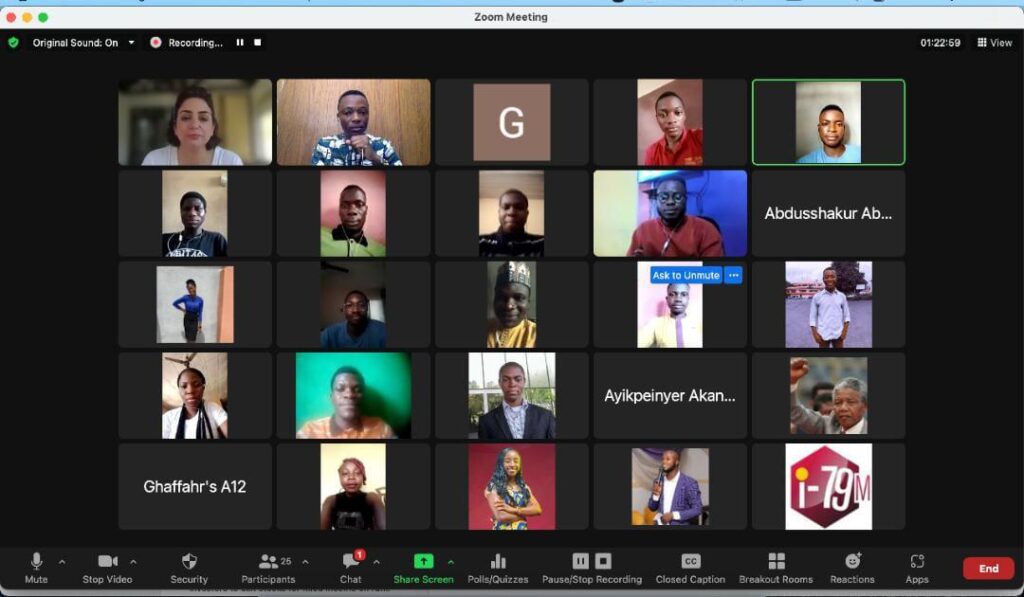Blessing Udeobasi writes on the training organised for campus journalists as part of the 2022 LEDE Fellowship by 1-79 Media Consults.
One of Nigeria’s leading media training hubs, I-79 Media Consults, has trained about 30 campus journalists from West Africa on the concept of solutions journalism.
The training organised as part of the 2022 LEDE Fellowship facilitated by the Solutions Journalism Network (SJN) also awarded a $100 grant each to 15 participants who were onboarded as Campus Solutions Ambassadors.
The three-day training held between 24th to 26th May 2022 engaged and prepared campus journalists to report social responses to challenges facing the education sector in their immediate environments.
Seven solutions journalist experts in Africa with a track record of enviable work facilitated the various sessions on the theme, “Campus Solutions” with a focus on different facets of solutions journalism.
On the first day of the training, Seun Durojaiye, Innocent Eteng, and Chibuike Alagboso dissected ‘The four pillars and impostors of solutions journalism’, ‘Effective storytelling and use of data in solutions reporting’, and ‘Anatomy of a SoJo story’ respectively.
READ ALSO: ‘Our experience writing solution stories’
Lekan Otufodunrin and Abass Mpindi facilitated the second day of the training, during which they explored ‘How to find solutions stories in the education sector and ‘News framing and reporting Africa through SoJo lenses’.
Day three of the training had Dina Aboughazala speaking on ‘Solutions reporting as a form of accountability journalism’, Dr Rasheed Adebiyi analysed the concept of ‘Drawing the line between solutions, developmental, and investigative reporting’ while Ifedayo Ogunyemi spoke on ‘Campus solutions asks and offers.’
To find solutions stories in the education sector, Otufodunrin, the Executive Director of Media Career Development Network (MDCN), advised participants to know the major issues and problems in the sector that people want solutions for.
For Eteng, the Founder and Co-editor at Prime Progress, effective storytelling goes beyond regular hard reporting. He said, “telling an effective story requires three levels of reporting, namely pre-reporting, interviewing & field research, and reporting.”
News framing, according to Mpindi, the Executive Director of the Media Challenge Initiative (MCI) based in Uganda, is the angle or perspective from which a story is told. Stressing the need for a more balanced narrative about Africa, he said, “solutions-oriented reporting will not only call out the wrong narratives but will also provide evidence to counter the narratives.”
Adebiyi who is a lecturer at Fountain University and Co-founder of AbitoCitta, during his session, said “Solutions journalism is a slant of developmental journalism and a form of investigative reporting that holds people accountable, discovers a response, investigates and draws insights as well as presents evidence.”
Speaking on the four pillars and impostors of solutions journalism, Durojaiye, the Founder of Social Voices, averred that solutions journalism is not an afterthought but a core part of the story responses to societal problems.
Aboughazala, Founder of Egab, disclosed that solutions journalism can be a tool for accountability directly or indirectly.
“Direct accountability investigates a solution by the entity we are holding accountable while the indirect one investigates a solution by another entity,” Aboughazala added.
Alagboso, who is a journalist at Nigerian Health Watch, said solutions journalism explores responses to problems that have replicable structures. He maintained that SoJo is holistic as it explores limitations, insights, evidence, and other key aspects of the solutions.
One of the trainees who also benefited from the grants, Akanuweir Ayikpeinyer, said, during the training, he was enlightened on what solutions journalism entails.
He added that the training puts him in the right state of mind and preparedness to become an effective solutions journalist.
For another participant, Monsuroh Abdulsemiu, the training was excellent as well as easy to access.
“The facilitators patiently explained their topics and tactically engaged the trainees. I’ve been yearning to learn about data visualisation, and Mr Ogunyemi talked about it during his session,” she said.
Olanshile Olalekan also said the sessions were able to dissect the intricacies of solution journalism.
“They were simplified, and I’m more knowledgeable about the subject matter,” he said.
Ogunyemi, a 2022 LEDE Fellow and Senior Reporter with the Nigerian Tribune, who spoke on the rationale behind the campus solutions programme, explained that the project seeks to equip campus reporters on how to “constructively report responses to the various challenges bedevilling the tertiary education system in West Africa.”
He added that the project will “give rise to a crop of campus ambassadors who will create SoJo units in their respective campuses,” adding that “it is high time we also focus on what we are getting right, not just the problems, in Africa.”
He further explained that the Campus Solutions project is being funded by the SJN as part of efforts to spread solutions journalism across the world.

